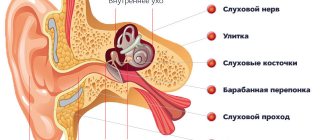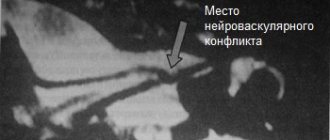Mechanism of development of vertigo
If we consider dizziness from an anatomical point of view, the causes of this condition are quite simple. The vestibular apparatus, responsible for human balance and coordination in space, is located in the inner ear. Vision and muscle reflexes help a person navigate the environment. All received information enters the brain. And it is he who controls the functioning of the vestibular apparatus.
Sometimes the connection between the inner ear and the brain can become disrupted. A person loses the ability to navigate in space. Dizziness appears. To restore the lost connection, the brain immediately launches several reactions at once. Some of them may affect neighboring centers (for example, emetic). This leads to the appearance of unpleasant accompanying symptoms.
Sudden dizziness: 5 simple reasons
Typically, loss of communication between the brain and the vestibular system is rare and does not last long.
Dizziness that occurs is not considered a pathology in the following cases:
- Ride the carousel. Such entertainment creates a serious load on the vestibular apparatus. And if it is naturally weak and untrained, then it may well fail. Such dizziness usually occurs in women, since they also have psycho-emotional experiences added to the load.
- Stress, anxiety. If dizziness occurs during a speech in front of a large audience or after a reprimand from a boss, then the cause of vertigo is the production of a large amount of adrenaline. This hormone causes vasospasm. And this leads to a temporary deterioration in blood flow in the brain.
- Climbing to heights. In this case, the unpleasant phenomenon is also considered a physiological norm. When rising to a height, a person’s eyes cannot quickly focus on distant and close objects. Abrupt switching between objects causes dizziness.
- Hunger. Similar problems are common to all fans of strict diets. If a person does not receive enough nutrition, then a glucose deficiency occurs in his body. The absence of the main “fuel” leads to deterioration of brain function and the appearance of dizziness.
- Active exercises. Exercise enthusiasts should remember moderation. Excessive exercise can cause low blood pressure. This leads to dizziness and sometimes fainting. The unpleasant condition may be caused by unsuccessful sudden movements of the head, as a result of which the blood supply to the brain is disrupted.
An attack of dizziness may occur in response to taking certain medications. The most common sources of unpleasant symptoms are NSAIDs, antidepressants, antibiotics, and cancer medications. If your head is “turned” by medications, be sure to consult a doctor to change the drug.
Vestibular migraine
Migraine is a widespread disease, the manifestations of which are very diverse. Most often, in addition to dizziness at normal blood pressure, migraine is accompanied by a severe headache. As a rule, it is one-sided, pulsating and can persist for several minutes, hours, or several days. Often during an attack there is increased sensitivity to light and sounds.
Some patients notice the appearance of an aura before the onset of a migraine. In most cases, it consists of the occurrence of visual disturbances: loss of visual fields, flickering of spots in front of the eyes, luminous lines, etc. The aura usually appears an hour or less before the onset of the attack, and then disappears without a trace.
Migraines are more often diagnosed in women, and episodes of dizziness may be directly related to the phase of the menstrual cycle.
Treatment is carried out with medication. Usually, to eliminate pain and dizziness, the same medications are prescribed as for classic migraine. If attacks occur frequently, basic therapy is selected that is appropriate to the situation. All patients are also advised to avoid stress, eat right, normalize their work and rest schedule, and regulate the amount of physical activity.
Severe dizziness: 6 pathological causes
The causes of dizziness are not always harmless. Sometimes illnesses become sources of unpleasant conditions. In this case, dizziness occurs quite often and can last longer than a few seconds. To cope with this phenomenon, you need to consult a doctor. The severity of a symptom can be reduced (and sometimes completely eliminated) only through proper treatment of the underlying disease.
So, the causes of dizziness may include the following pathologies:
- Vegetovascular dystonia (VSD). A complex disorder in which a person experiences multiple impairments. All these symptoms are associated with malfunctions of the autonomic system. One of the common signs of VSD is dizziness. Such attacks are usually caused by sudden movements and rapid changes in posture. Dizziness does not last long. They go away on their own, without any intervention.
- Disorders in the cervical spine. Various injuries, osteochondrosis, intervertebral hernias can periodically remind you of themselves with sudden attacks of dizziness. They usually appear after active neck movements. The attack is accompanied by pain in the affected area, sometimes a crunching or crackling sound is heard.
- Anemia. Dizziness may occur due to iron deficiency. Most often this pathology is observed in children and women. With anemia, attacks are accompanied by high fatigue, weakness, pale skin, and pre-fainting conditions.
- Psychogenic dizziness. The reason for this pathology lies in the patient’s increased anxiety (people with an unstable psyche) or in the stress they have endured. Such people usually complain of poor sleep, fear of losing consciousness, a periodic feeling of shortness of breath, and increased heart rate.
- Vertebrobasilar insufficiency. This is a pathology in which blood flow in the vertebral or basilar arteries is weakened. Such problems lead to disruption of brain function. The pathology is characterized by regular attacks of dizziness, which can last up to an hour. In addition, patients complain of nausea, vomiting, and visual disturbances may occur. I often have a headache.
- Hypotension. A decrease in blood pressure is often accompanied by attacks of dizziness. Sometimes lightheadedness may occur.
Vestibular neuronitis
Vestibular neuronitis or neuritis means inflammation of the vestibular root of the 8th pair of cranial nerves, i.e., the vestibular-cochlear nerve. It has not yet been reliably determined what exactly provokes the development of this disease. According to research, it is assumed that herpes virus infection type 1 is involved in this. This theory is also supported by the fact that most often neuritis manifests itself after suffering from an acute respiratory infection.
The disease is characterized by a sudden onset of severe dizziness with a sensation of rotation of surrounding objects, which tends to gradually weaken over time. But head movements or changes in body position provoke a deterioration in health. The attack is accompanied by nausea, vomiting, and nystagmus. In this case, the oscillatory movements of the eyes are directed towards the healthy ear. There is also an imbalance, with falls more often occurring on the side of the healthy ear. But vestibular neuritis is not accompanied by hearing impairment or neurological disorders.
Dizziness may last for hours or days, and unsteadiness may persist for a week or longer.
When diagnosing vestibular neuronitis, symptomatic therapy is indicated to alleviate the patient’s well-being. It is designed to eliminate nausea, vomiting and reduce the severity of dizziness. Specific drugs are selected by a neurologist individually, taking into account the characteristics of the patient’s condition and the nature of concomitant diseases. As a rule, the course lasts no more than 3 days.
It is also recommended to perform special visual exercises, head movements, walking and balance exercises. They need to be performed daily, devoting at least half an hour to exercise.
In most cases, the measures taken are sufficient to eliminate the disease and normalize the patient’s condition. Within a few weeks, central vestibular compensation occurs, which leads to the elimination of the symptoms of neuritis. But instability and difficulty maintaining balance, especially when moving the head, can persist for a long time. But in 15% of patients, after the symptoms of vestibular neuronitis subside, the development of BPPV is observed, and psychogenic dizziness often occurs.
Severe dizziness: 6 dangerous reasons
In some cases, vertigo signals the development of severe conditions that require immediate medical attention. Causes of severe dizziness may include:
- Labyrinthitis (internal otitis). A viral infection in the inner ear may be asymptomatic at first. The only sign of otitis media is dizziness, which lasts for several minutes. Such attacks are repeated quite often. In the future, the viral process can affect the nervous system or brain.
- Concussion. Sometimes after a head injury, only dizziness appears. This symptom should not be ignored. It serves as direct evidence of a concussion. To eliminate the risk of swelling or serious brain damage, you should immediately seek medical help.
- Stroke. If dizziness is accompanied by sudden weakness, complaints of numbness of a body part, visual impairment, speech disturbances, then the risk of stroke is high. This is a severe pathology in which blood circulation in the brain is disrupted.
- Migraine. Dizziness accompanied by a severe headache may indicate a migraine. Many people believe that this condition is harmless. But doctors say that migraine, especially in an advanced state, can lead to severe damage (sometimes even to a heart attack or stroke).
- Cardiovascular diseases. Such pathologies are characterized by the appearance of dizziness every time a person gets up. It is caused by a sharp decrease in pressure. Symptoms like these may indicate dehydration, which is causing your blood to thicken. But if the problem is not fluid deficiency, then it may be the development of arrhythmia or heart failure.
- Tumors. Regular attacks of vertigo combined with headaches, usually in one side of the head, can signal the development of a tumor in the brain.
The main causes of cephalalgia
Acute pain in the head and throbbing prevents a person from living a normal life and doing business. If pain appears once, this does not necessarily indicate the presence of dysfunction in the body. In cases where a person experiences cephalalgia more and more often, and the pain lasts longer and longer, there really is a problem in the body. It needs to be eliminated, and only a specialist can handle it.
Doctors identify a number of main reasons that cause this symptom, namely:
- VSD (vegetative-vascular dystonia);
- atherosclerosis;
- sinusitis, sinusitis;
- migraine;
- eye diseases;
- hematomas;
- tumors;
- neuralgia;
- stress.
Vegetovascular dystonia
Pulsating pain is called background pain. It occurs due to a decrease in the tone of cerebral vessels, stagnation of blood, and spasms of the arteries. The difference between pain that appears due to VSD is that “jolts” do not depend on the person’s pulse.
Atherosclerosis
If a patient has problems with the vascular system, he begins to suffer from pulsation in the temporal and occipital areas of the head. But the zones can change, and the sensations can become oppressive over time.
Sinusitis, sinusitis
The reason lies in the cold you suffered, namely its complications. In order not to encounter cephalalgia, it is imperative to cure all viral and infectious diseases. The same applies to a runny nose.
Migraine
Migraine is manifested by a pulsation, which patients describe as if it were pounding right under the skin, and the pain is localized in one part of the head at the top.
Scientists have not yet proven the definitive causes of such pain, and the exact forms of manifestation of the disease have not yet been determined.
But still, there are several possible causes of migraine development, namely:
- food products (several types of cheeses and sausages);
- weather sensitivity;
- smells of ammonia, ammonia, perfume;
- serious physical activity;
- emotional outburst;
- uncomfortable body position for a long time.
A migraine can torment a person for more than one day. There are cases when the pain lasts 3 days. Most often, cephalalgia caused by this problem manifests itself in unbearably severe pain, and can go away after a few hours. Doctors note the fact that females suffer more from this.
At the end of a migraine attack, a person notes that he has severe weakness and a tendency to sleep.
Eye diseases
The following reasons that can provoke pulsation are eye diseases. A large number of people turn to specialists with complaints such as blurred vision, nausea, dizziness, photophobia, and acute pain radiating to the eye. A competent doctor will immediately determine that these are symptoms of angle-closure glaucoma - high intraocular pressure.
Cephalgia can develop due to tension in the optic nerve, which occurs due to incorrectly selected diopters of glasses or lenses. But in such cases, dizziness also appears.
Hematomas, tumors
Pulsating pain of a strong nature, which is clearly localized in one of the areas of the head, may indicate the presence of damage or a neoplasm. Also in this case, it is worth noting the presence of nausea and vomiting.
If such symptoms are noticed, you must quickly contact a specialist to diagnose a tumor or other problem and begin to treat it.
Stress
All overwork and emotional turmoil can result in severe headaches. Constant nervous tension and stress can create a “fellow traveler” for you for the whole day, namely cephalgia.
Neuralgia
Another common reason why such unpleasant sensations occur in the temple and head area. Dental problems, trigeminal neuralgia - all this provokes pain.
Other causes of cephalalgia
Osteochondrosis and a number of other problems associated with the cervical spine can provoke throbbing pain.
In winter, pulsation in the back of the head often occurs. This is explained by hypothermia and a sharp narrowing of blood vessels.
Lack of normal rest, disruption of sleep quality and routine can cause headaches.
Bad habits are also included in this list of “provocateurs”. They not only harm health, but can also cause discomfort to a person in the form of cephalgia. If a person often drank coffee and decided to abruptly stop, this can also provoke this problem, since the blood vessels are not able to return to normal so quickly.
Not everyone knows, but what we eat can also cause throbbing in our temples. These products include: chicken liver, cheeses, sausages, bacon, nuts, yogurt.
What to do?
It is almost impossible to independently determine the causes of frequent attacks of dizziness. Therefore, those who regularly experience vertigo are advised to go to an appointment with a therapist, or a neurologist. The specialist will carefully examine the patient’s complaints and prescribe diagnostic tests. If necessary, the doctor will refer the patient for consultations with an ENT specialist, an ophthalmologist, a cardiologist, or an endocrinologist.
To identify the causes of vertigo, the patient may be prescribed the following tests:
- Neurological tests. They allow you to assess the functionality of the vestibular apparatus.
- MRI or CT. Such brain studies reveal various disorders (hemorrhages, tumors, vascular pathologies).
- Ultrasound Doppler. Using Doppler ultrasound, the condition of the vessels of the head and neck is studied.
- Audiometry. Diagnostics allows us to assess hearing function.
- EEG. To study the activity of the cerebral cortex, the doctor will prescribe electroencephalography.
To quickly cope with dizziness (of course, if it is not caused by dangerous reasons), you can sit on any surface, relax a little and take 5-6 deep breaths. Be sure to open the window (if you are indoors) to provide fresh air. If the causes of vertigo are harmless, then such actions are quite enough for the dizziness to disappear without a trace.
Treatment and prevention methods
If, upon getting out of bed, a person experiences frequent bouts of dizziness, a doctor’s consultation is indicated. It is possible to objectively distinguish the course of pathological processes in the body from true vertigo only through a set of laboratory tests. For this purpose, the following procedures are prescribed:
- blood and urine tests;
- X-ray of the cervical spine;
- MRI of the brain;
- Ultrasound of the abdominal cavity and other internal organs.
The further treatment regimen is determined based on the results of the study, examination and collection of medical history.
Prevention of dizziness involves following the recommendations of the attending physician and carrying out simple actions:
Advertising:
- observe the rules of work and rest;
- eat well;
- do not stay in forced positions for a long time that interfere with blood circulation;
- avoid sudden movements when getting out of bed in the morning and throughout the day;
- When playing sports, physical activity is normalized.
It is important to monitor your health, do not panic if mild vertigo is present, but seek medical help in time as needed.










